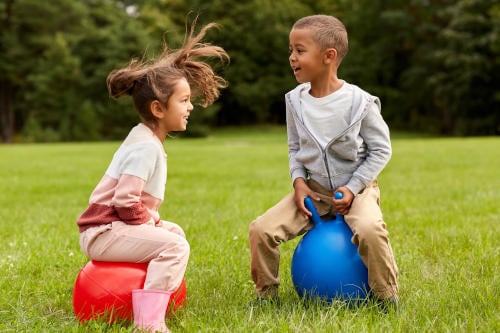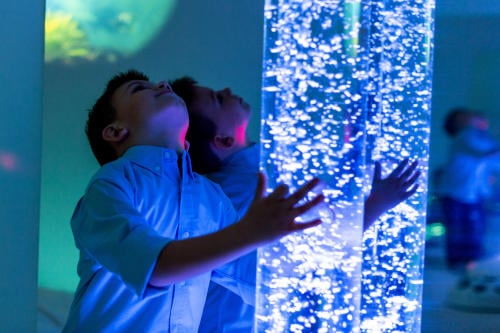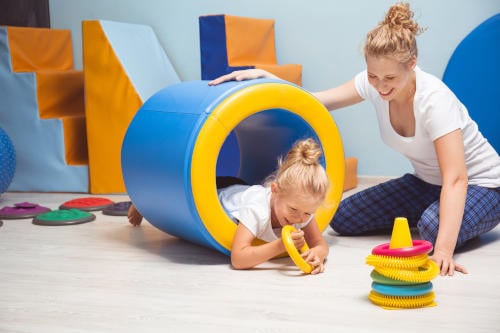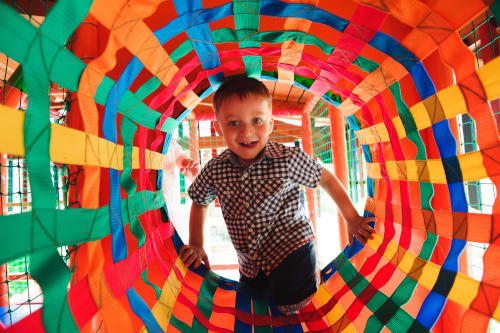According to the British Association of Play Therapists’ website,
‘Play is children’s primary form of communication. Children tell us about their inner world through play long before they are able to link words to their experiences through language. Through play, children can experiment with, process and master different skills and experiences. They form a sense of who they are, whilst learning to understand that other people can be different from them. Relationship skills, such as being able to trust, respect, empathise, share and co-operate with people, can be developed through play.’
‘Play Therapy, therefore, is a form of counselling for children that builds on this developmentally appropriate form of communication through play. It enables children to explore difficult experiences in a safe environment.’
As you might imagine, play therapy is often used for children who have been through difficult or traumatic experiences. However, it can also help young people with special needs to make sense of their world.
Play Therapy Helps Kids with SEN to Communicate

Cathryn Hicks is a qualified play therapist and runs Juniper Play Therapy in Peterborough. She is also a former primary school teacher with more than ten years’ experience working with children with a variety of SEN.
“Children with special needs, especially those that are neurodiverse, are often hugely anxious and not easily able to communicate their needs,” she observes. “There can be a lot of frustration which causes them to act up. There’s a huge reliance on verbal communication in our society and that can be difficult for some people.”
For kids who struggle in this way, she points out, play therapy offers a gentler way of exploring their feelings and experiences. So, what happens in a play therapy session and how does it work?
Children Take the Lead

Although play therapy is a complex subject, Cathryn explains that in simple terms, it applies the different stages of play that children naturally pass through as they grow and mature – sensory play and role-playing would be two examples of this. However, much of the action in a therapy session is often centred round ‘projection’, she continues, where children use miniature figures to tell stories which indicate how they may be feeling themselves.
“All play therapy is non-directive,” she elaborates. “When a child comes into the room, I follow their lead. They choose what to play with – I have a huge range of toys from puppets and baby dolls to fidget toys, dolls’ houses and castles. I don’t join in unless they ask me to. Even then, I allow them to be in control – I might ask, ‘What shall I say?’ or ‘What would you like me to do?’
“Play therapists believe that the child knows inside what they need to do to process their feelings. Being free to decide what happens in the session, children can keep a ‘safe’, psychological distance from the issue and project what happened onto their character.”
Accepting the Young Person’s Feelings

Therapists also make micro-observations about what the child is doing, Cathryn adds, making comments such as, ‘he looks a bit sad’ or ‘I wonder what she is going to do now?’ This, she says, is a subtle way of validating a child’s feelings.
“Often, as adults, we don’t do this in everyday life. We say things like, ‘You’ll be OK in a moment,’ when we’re trying to help a child feel better. But acknowledging their feelings can help them learn to regulate themselves.”
If a child has special needs, play therapy can also help children accept themselves. “One boy I worked with who had ADHD told me that other people found him irritating,” she carries on. “I was able to offer more positive observations. I told him, ‘I love the way that you think differently!’”
Play Therapy Builds Resilience

Playing board games, Cathryn says, allows a young person to negotiate their relationship with the therapist. “You let kids make up the rules and at first, they often need to win. But as they get to know you, they will let you win sometimes. Again, you can reflect this back to them by saying, ‘That’s changed!’”
She maintains that all youngsters could benefit from play therapy. “I really wish I’d had it as a child. I didn’t have anything awful happen to me – just the usual ups and downs of life – but I think that helping children to process their experiences creates more resilient adults.”




